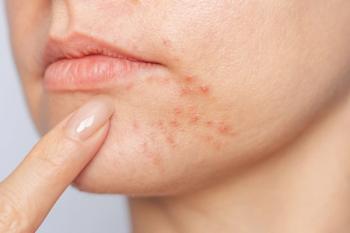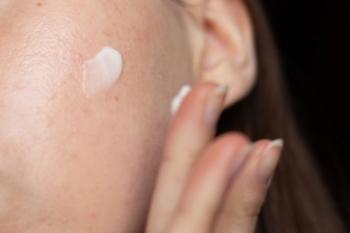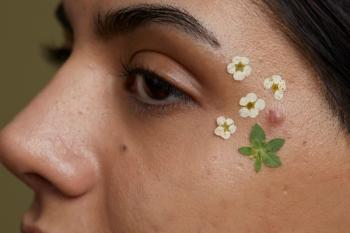
- Dermatology Times, July 2020 (Vol. 41, No. 7)
- Volume 41
- Issue 7
Acne topical efficacy mixed
A recent Cochrane review compared the benefits of several topical acne treatments. Researchers found mixed quality of evidence for PGA outcomes. In the absence of high-quality evidence, management decisions should be guided by clinical experiences and patient preferences.
A recent Cochrane review1 evaluated the therapeutic value of several topical acne treatments against placebo, no treatment and other topical treatments, finding mixed results.
The therapeutic success of any given acne treatment hinges on many different factors and fortunately, clinicians currently have a number of effective anti-acne agents in their armamentarium.
“Treatments options for acne are often targeted at the factors implicated in acne development, such as sebaceous hypersecretion, abnormal keratinization, C. acnes bacteria colonization, and the inflammation process,” writes Frank Peinemann, M.D., pediatric oncology and hematology, Children’s Hospital, University of Cologne, Cologne, Germany, and fellow researchers. “The choice of treatments depends on the type and extent of the acne.”
Topical retinoids such as adapalene and tretinoin, and antimicrobials such as benzoyl peroxide and antibiotics can all be considered first-line therapies; however, the clinical benefit of other topical acne medications including azelaic acid, salicylic acid, nicotinamide, sulfur, zinc and alpha hydroxy acid is unclear.
Researchers assessed the effects of six topical treatments including azelaic acid, salicylic acid, nicotinamide, zinc, alpha hydroxy acid and sulfur on patients with acne when compared with placebo, no treatment, or other topical treatments. Numerous databases such as the Cochrane Skin Group Specialized Register, CENTRAL, MEDLINE, Embase and LILACS, as well as five trial registers were searched through May 2019 to include a review of 49 trials with a total of 3,880 reported participants.
The vast majority of subjects were female, aged between 12 to 30 years, with mild to moderate acne. Nearly 60% of the trials treated patients for longer than eight weeks, and study duration ranged from three months to three years. Key outcomes included participants’ global self-assessment of acne improvement (PGA), withdrawal for any reason, minor adverse events, and quality of life.
Researchers identified studies with moderate-quality evidence showing that azelaic acid is probably less effective than benzoyl peroxide in terms of treatment response (PGA), and there is probably little or no difference when comparing azelaic acid to tretinoin. Results also showed that for other comparisons and outcomes of topical treatments, the quality of evidence was low or very low.
According to the researchers, the quality of evidence was mixed for the PGA outcomes (very low to moderate), mainly low quality for withdrawals, and very low quality for total minor side effects.
“Presently, clinicians often choose topical retinoids and antimicrobials as the first choice of treatment for mild and moderate acne. The data in this review show there is no high-quality evidence to determine the effects of the topical treatments azelaic acid, salicylic acid, nicotinamide, sulfur, zinc and alpha hydroxy acid over the commonly used topical drugs. In some cases, the comparative studies suggest no difference between these topical treatments and commonly used retinoids or antimicrobials, but we cannot draw definitive conclusions due to very low- to low-quality evidence,” the authors wrote.
There isn’t sufficient evidence to determine the efficacy and safety of zinc, sulfur and gluconolactone, the authors write, and the limited number of trials as well as inadequate reporting made obtaining high-quality evidence challenging. In the absence of high-quality evidence for these treatments, the authors suggest that clinical decisions may continue to be guided by clinical experiences and patients’ preferences.
“There is a need for further head-to-head comparisons of the topical treatments azelaic acid, salicylic acid, nicotinamide and glycolic acid with commonly used active drugs (i.e., topical retinoids and antimicrobials). Moreover, trials comparing these topical treatments with vehicle/placebo or no treatment are also required. This will confirm their efficacy for treating mild to moderate acne,” the authors wrote.
Disclosures:
Dr. Peinemann reports no relevant disclosures.
Reference:
1 Liu H, Yu H, Xia J, Liu L, Liu GJ, Sang H, Peinemann F. Topical azelaic acid, salicylic acid, nicotinamide, sulphur, zinc and fruit acid (alpha-hydroxy acid) for acne. Cochrane Database Syst Rev. 2020 May 1;5:CD011368.
Articles in this issue
over 5 years ago
Injection technique aims to optimize outcomesover 5 years ago
COVID-19: Counseling patients on biologic useover 5 years ago
COVID-19 impact in patients on biologicsover 5 years ago
Immunotherapy implications for NMSCover 5 years ago
Study evaluates topical plus device for rosacea treatmentover 5 years ago
Apremilast treatment in a patient with COVID-19over 5 years ago
An examination of rosacea treatment satisfactionover 5 years ago
IL-17 inhibition a path of interest in rosacea treatmentover 5 years ago
Patient appearance challengesover 5 years ago
Physical sunscreens sidestep concernsNewsletter
Like what you’re reading? Subscribe to Dermatology Times for weekly updates on therapies, innovations, and real-world practice tips.











